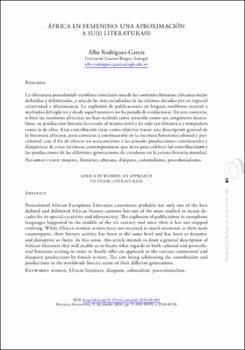África en femenino: una aproximación a su(s) literatura(s)
Autor
Rodríguez-García, AlbaFecha
2018Resumen
La «literatura poscolonial» eurófona constituye una de las corrientes literarias africanas mejor definidas y delimitadas, y una de las más estudiadas en las últimas décadas por su especial creatividad e idiosincrasia. La explosión de publicaciones en lenguas eurófonas ocurrió a mediados del siglo xx y desde aquel entonces no ha parado de evolucionar. En este contexto, si bien las escritoras africanas no han recibido tanta atención como sus congéneres masculinos, su producción literaria ha estado al mismo nivel y ha sido tan dinámica y rompedora
como la de ellos. Esta contribución tiene como objetivo trazar una descripción general de la literatura africana, para centrarse a continuación en la escritura femenina colonial y poscolonial, con el fin de ofrecer un acercamiento a las actuales producciones continentales y diaspóricas de estas escritoras contemporáneas que sirva para celebrar las contribuciónes y las producciones de las diferentes generaciones de creadoras en la escena literaria mundial. Postcolonial African Europhone Literature constitutes probably not only one of the best
defined and delimited African literary currents but one of the most studied in recent decades for its special creativity and idiosyncrasy. The explosion of publications in europhone
languages happened in the middle of the xx century and since then it has not stopped
evolving. While African women writers have not received as much attention as their male
counterparts, their literary activity has been at the same level and has been as dynamic
and disruptive as theirs. In this sense, this article intends to draw a general description of
African literature that will enable us to frame what regards to both colonial and postcolonial feminine writing in order to finally offer an approach to the current continental and
diasporic productions by female writers. The aim being celebrating the contribution and
productions to the worldwide literary scene of their different generations.





